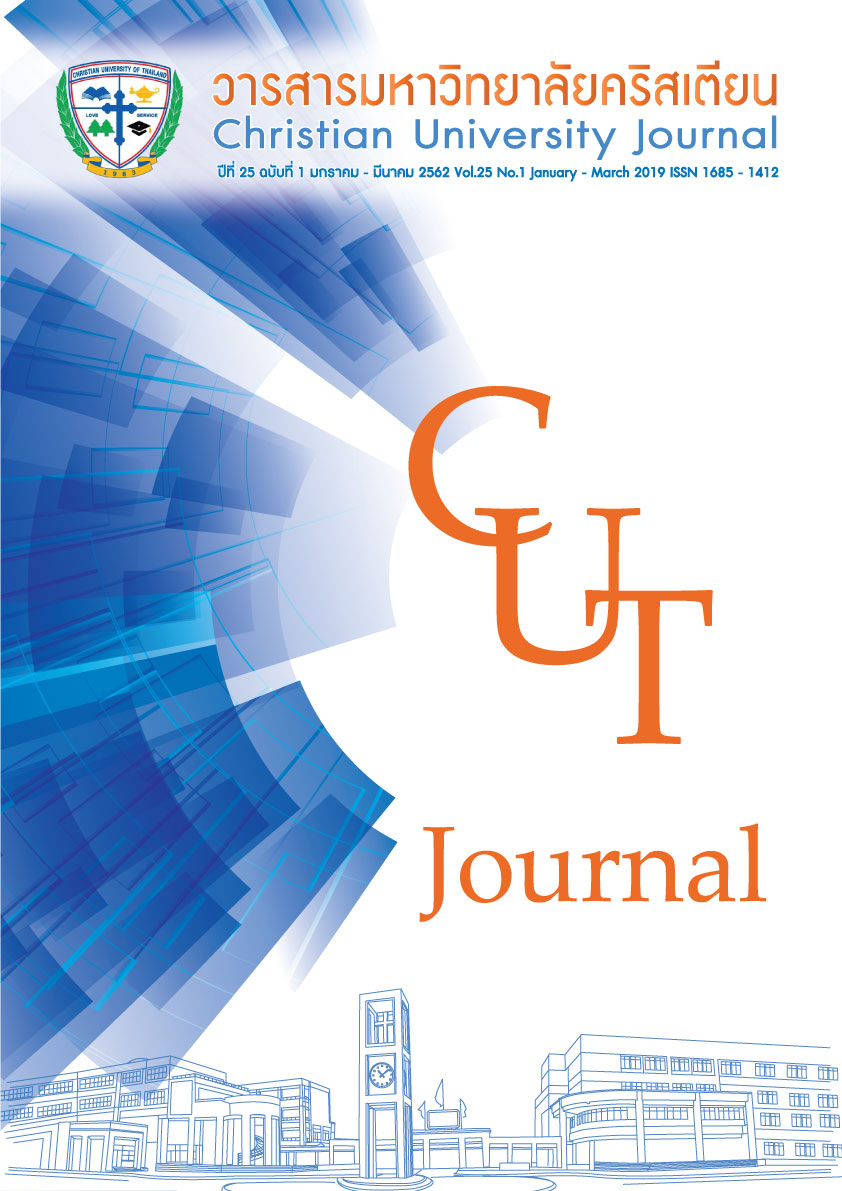ผลของการใช้เกมในการเสริมสร้างการเรียนรู้คำศัพท์ทางการแพทย์ ของรายวิชาภาษาอังกฤษ 3 นักศึกษาสาขาวิชาพยาบาลศาสตร์ ที่มหาวิทยาลัยเอกชนแห่งหนึ่งในจังหวัดนครปฐม
คำสำคัญ:
การใช้เกม, คำศัพท์ทางการแพทย์, การเรียนรู้คำศัพท์บทคัดย่อ
งานวิจัยนี้มีจุดประสงค์เพื่อศึกษาความสัมพันธ์ระหว่างการใช้เทคนิครูปแบบของเกมช่วยในการเรียนรู้คำศัพท์ทางการแพทย์ ผู้วิจัยทำการวิจัยกึ่งทดลองกับนักศึกษาพยาบาลที่ลงทะเบียนเรียนวิชาการอ่านภาษาอังกฤษ 3 จำนวน 16 คน โดยนำการวิเคราะห์ผลทางสถิติ Paired T-Test มาใช้วัดผลการทดสอบก่อนและหลังเรียน (Pre- test and Post-test) และแบบสำรวจความคิดเห็น ถูกนำมาใช้ในการสำรวจความคิดเห็นของผู้เรียน ในการใช้เทคนิครูปแบบของเกม เช่น Kahoot! และ Quizizz มาช่วยในการสอนนั้น ใช้เวลา 10 ชั่วโมง ภายใน 2 เดือนนอกเหนือจากการทำการทดสอบก่อนเรียน 1 ชั่วโมงในวันแรกของการเรียนและการทดสอบหลังเรียน 1 ชั่วโมงในวันสุดท้ายของการเรียนวิชานี้ ผลการทดลองเครื่องมือมีค่าความแตกต่างทางสถิติอย่างมีนัยสำคัญ 0.01 แสดงให้เห็นว่า นักศึกษามีการพัฒนาที่ดีขึ้นมากในด้านทักษะการเรียนรู้คำศัพท์ทางการแพทย์ ในส่วนของการทดสอบทัศนคตินั้นจะเห็นได้ว่า ผู้เข้าร่วมการวิจัยมีทัศนคติเชิงบวกสูง ผลการวิจัยนี้มีความสอดคล้องกับการวิจัยครั้งก่อนหน้าที่ชี้ให้เห็นว่า การใช้เทคนิครูปแบบของเกม เช่น Kahoot! และ Quizizz มีผลต่อการเรียนรู้และเพิ่มคำศัพท์ทางการแพทย์ของผู้เรียน จึงเสนอแนะได้ว่า การใช้เทคนิครูปแบบของเกมสามารถช่วยนักเรียนในการเรียนรู้คำศัพท์ทางการแพทย์ได้ดีขึ้น
เอกสารอ้างอิง
Bin-Shyan, J., Chien-Hung, L., Yen-The, H., Tsong-Wuu, Cheng-Yu, L. (2013). Using Game-Based Cooperative Learning to Improve Learning Motivation: A Study of Online Game Use in an Operating Systems Course. IEEE Transactions on Education, 56(2),183-190.
Bradword-Networks. (2013). The Impact of BYOD in education (pp1-16). Bradford Networks.
Burke, B. (2014). Gartner Redefines Gamification. Retrieved December 21 , 2017, from http://blog.gartner.com/brian_burke/2014.
Carter, K.F. & Xu, Y. (2007). Addressing the hidden dimension in nursing education:
promoting cultural competence. Nurse Educator, 32(4), 149-153.
Castro, R. (2015). The Effects of Using Structural and Contextual Analyses Strategy in Developing the Vocabulary Skill of Undergraduate Students at a Private University in Nakhon Pathom. Graduate School, Christian University of Thailand.
Castro, R. (2016). The Effects of Using Computer Assisted Language Learning in Enhancing Vocabulary Knowledge of English I Students at a Private University in Nakhon Pathom. Christian University of Thailand.
David, J., (2010). What Research says About…/Closing the Vocabulary Gap. Retrieved May 5,2015, from www.ascd.org.
Dewan, G. (2013). Computer Assisted Vocabulary Learning Package for Nursing Students and their Learning Attitude. Prince of Songkla University. Master of Arts Degree in Teaching English as an International Language. Retrieved August 14, 2016, from http://kb.psu.ac.th/.
Duadsuntia, T. (2008). Using a Keyword Method to Enhance Learners’ Vocabulary Recall and Retention. Master of Arts Thesis in English, Graduate School, Khon Kaen University.
Liangpanit, C. (2015). Vocabulary Learning Strategies for Thai Learners: Research to Practice. Journal of Humanities and Social Sciences Thaksin University, 15(2), 119-131.
Mongkol, N. (2008). A Study of Vocabulary Learning Strategies of the First and Second Year Students from English Department of Phetchaburi Rajabhat University. Master of Arts Thesis in English for Specific Purposes, Graduate School, Kasetsart University.
Nation, I.S.P. (1994) Review of three books on vocabulary teaching. System , 22(2), 15-19.
Nomsiri, W. (2005). Needs of Business Administration Students for Business English Reading Course. Master of Arts Independent Study in English, Graduate School, Khon Kaen University.
Quizizz. (2017). Help Center. Retrieved November 30, 2017 from https://quizizz.zendesk.com/hc/en- us Date accessed.
Richardson, M. L. (2009). Using an Exploratory Internet Activity & Trivia Game to Teach Students about Biomes. Science Activities: Classroom Projects And Curriculum Ideas, 46(2), 19-24.
Sedita, J. (2005). Effective Vocabulary Instruction. Insights on Learning Disabilities, 2(1), 33-45.
Sharma, S. A., & Unger, S. (2016). Employing web 2.0 technologies to support students’ academic vocabulary acquisition. Michigan Reading Journal, 48(3a), 17-29.
Socrative (2017). Socrative Support Retrieved December 15, 2017 from http://help.socrative.com / Date accessed.
Tunchalearnpanih, P. (2012). Using Games on P.6 Student's Vocabulary Learning Cambridge: Cambridge University Press.
Wang, A. I. (2014). The wear out effect of a game-based student response system. Computers & Education, (82), 217-227.
Wilkins, D. (1972). Linguistics in Language Teaching. London: Arnold.



